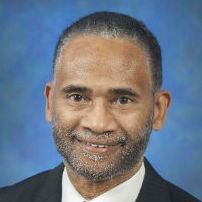 Richard Baker was named senior vice dean of medical education for the Wayne State University School of Medicine in Detroit. Dr. Baker initially joined the School of Medicine in August 2015 to lead the modernization of the medical education curriculum and to address accreditation standards. Earlier, Dr. Baker held a number of key leadership positions at Charles Drew University of Medicine and Science in Los Angeles including provost and dean of the College of Medicine.
Richard Baker was named senior vice dean of medical education for the Wayne State University School of Medicine in Detroit. Dr. Baker initially joined the School of Medicine in August 2015 to lead the modernization of the medical education curriculum and to address accreditation standards. Earlier, Dr. Baker held a number of key leadership positions at Charles Drew University of Medicine and Science in Los Angeles including provost and dean of the College of Medicine.
Dr. Baker received a bachelor’s degree in physics from Stanford University. He received his medical doctorate from Harvard Medical School.
 Imani N. S. Munyaka is a new assistant professor of computer science and engineering in the Jacobs School of Engineering at the University of California, San Diego. Dr. Munyaka’s research centers on security and privacy, in particular how these areas impact communities of color.
Imani N. S. Munyaka is a new assistant professor of computer science and engineering in the Jacobs School of Engineering at the University of California, San Diego. Dr. Munyaka’s research centers on security and privacy, in particular how these areas impact communities of color.
Dr. Munyaka is a graduate of the University of Dayton in Ohio, where she majored in electrical engineering. She holds a master’s degree in computer science from Kentucky State University and a doctorate in human-centered computing from the University of Florida.
 Oberlin College and Conservatory in Ohio has selected Ted Evans as the new director of entrepreneurship and an instructor in business. He was a senior director of several key areas — admissions, recruitment, corporate relations, placement, fellowships, internships — at the Weatherhead School of Management at Case Western Reserve University in Cleveland.
Oberlin College and Conservatory in Ohio has selected Ted Evans as the new director of entrepreneurship and an instructor in business. He was a senior director of several key areas — admissions, recruitment, corporate relations, placement, fellowships, internships — at the Weatherhead School of Management at Case Western Reserve University in Cleveland.
Evans is a graduate of the University of Kansas. He holds an MBA from Case Western Reserve University.


If Richard’s new position does not result in any significant increase in native born Black Americans into Wayne State University School of Medicine then what’s the point? Let me guess! It will allow implicitly racist Wayne State University School of Medicine to say “we promote diversity, equity, and inclusion”.
In other words, this position is mere symbolic akin to when Richard was at Charles Drew University of Medicine in which native born Black Americans were marginalized at every level.